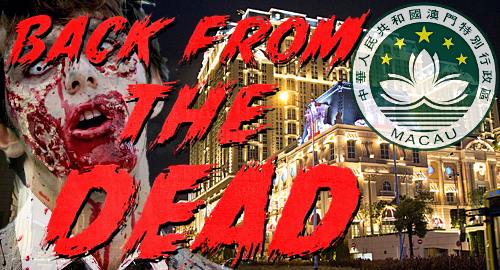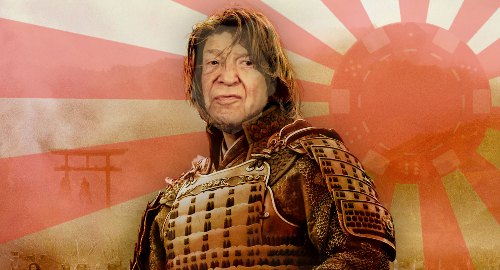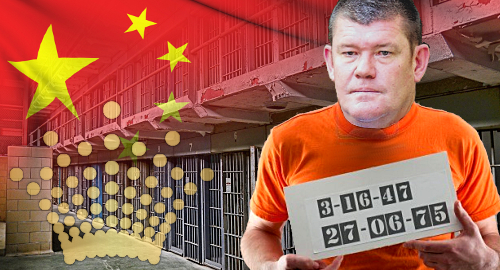It’s been a long and largely sucktastic year, so without wasting any more of anyone’s time, here are the top casino stories of 2016:
 MACAU BOUNCES BACK
MACAU BOUNCES BACK
Macau’s casinos broke their prolonged losing streak in August, posting their first year-on-year gaming revenue gains in 26 months. The positive momentum has continued for four months now, offering operators further hope that their long jurisdictional nightmare is finally behind them.
Macau welcomed two new integrated resorts in 2016, and so far the pair have experienced wildly different fortunes. In keeping with Wynn Resorts’ boss Steve Wynn’s penchant for opulence, Wynn Palace was aimed at high-end customers, a demographic that wasn’t yet in short supply when the $4b project began construction several years back. Wynn Palace has to date performed far below expectations, forcing management to make changes to its gaming floor meant to attract more mass market customers.
By contrast, Las Vegas Sands’ Parisian Macao roared out of the gates, reporting earnings of $19.2m in its first 18 days while generating massive foot traffic to its Eiffel Tower replica. Sands’ traditional emphasis on the mass market appears especially prescient given that the VIP share of Macau’s overall gambling revenue fell to a record low in Q3.
That ongoing VIP slump played havoc with some of Macau’s better known junket operators. Iao Kun Group Holdings reported a nine-figure loss in Q2 while closing four of its five Macau VIP rooms and reneging on its commitment to buy a South Korean casino after it couldn’t raise the necessary financing. The once vaunted Neptune Group announced that it was getting into the money lending business because it couldn’t foresee when its floundering gaming operations might rebound.
The already struggling junkets took a further hit this spring when Macau regulators banned telephone proxy betting. While the practice is reportedly still available in some Macau VIP rooms, the subsequent gains in other gaming jurisdictions like the Philippines strongly suggest that junkets have encouraged their high-rollers to dial new phone numbers.
 JAPAN’S CASINO SUN RISES
JAPAN’S CASINO SUN RISES
After a decade of dancing around the issue while cautiously gauging public reaction, Japanese legislators finally succeeded in passing their first-stage casino bill in the waning hours of the 2016 extraordinary legislative session.
The bill’s passage was wildly unpopular with many opposition parliamentarians, and dissent was also evident among the ruling Liberal Democratic Party. There’s even been some early polling that shows decreased support for the LDP and Prime Minister Shinzo Abe in the wake of the casino bill’s passage.
But international casino operators could have received no better Christmas present from the LDP. While Macau’s market appears to have finally regained its footing following over two years of revenue declines, the ability to tap into a major new market with significant purchasing power and minimal crossover from Macau is the tonic Asian casino operators needed. Word has it that a certain Las Vegas Sands boss is now emphasizing his Japanese bona fides by requiring underlings to refer to him as Sheldon Adel-san.
 CHINA GETS TOUGH WITH CASINO MARKETING
CHINA GETS TOUGH WITH CASINO MARKETING
The October arrests of 18 Crown Resorts marketing staff on the Chinese mainland sent a chill through Asia-Pacific casino operators. Beijing had publicly warned that it would no longer tolerate casino operators enticing mainland residents to come gamble but Crown management apparently didn’t take the threat seriously.
While Crown has been criticized for its aggressive mainland marketing efforts, it may be significant that the first major operator to be targeted in this fashion was not one of Macau’s six concessionaires (although Crown has a minority stake in Melco Crown Entertainment). China had previously only targeted companies promoting travel to South Korean casinos.
The kerfuffle appears to have forced Crown’s hand in curtailing its international ambitions and focusing on its domestic operations. Having already begun the process of lessening its Melco Crown stake, Crown sold an even larger stake in December, giving Lawrence Ho majority control over the former joint venture and (perhaps) signalling to Beijing that Melco Crown isn’t to blame for Crown’s excesses.
IMPERIAL PACFIC’S VIP TURNOVER
Best Sunshine Live, Imperial Pacific International Holdings’ temporary casino in a Saipan shopping mall, raised eyebrows this year as its average monthly VIP turnover jumped from $2b to nearly $4b, with a per-table average that outpaced Macau’s mega-resorts, despite the property being described by one critic as “a duty-free store with a fresh coat of paint and some chandeliers.”
The gambling surge reportedly caught the eye of US financial watchdog FinCEN, which has jurisdiction over the Commonwealth of the Northern Mariana Islands and has previously slapped eight-digit fines on another CNMI operator for “willful and egregious violations” of the US Bank Secrecy Act.
Imperial Pacific has denied knowledge of any US probe but Best Sunshine’s turnover could come under further scrutiny now that Saipan regulators have begun approving junket operator licenses and a former table games VP has accused the casino of skirting anti-money laundering rules. The media attention appeared to have taken its toll, as the property’s turnover fell to just $1.75b in November, less than half the previous two months’ figures.
 PHILIPPINE CASINOS SURVIVE THE GREAT BANGLADESHI BANK HEIST
PHILIPPINE CASINOS SURVIVE THE GREAT BANGLADESHI BANK HEIST
In February, Bangladesh reported the cyber theft of over $100m from its accounts at the Federal Reserve Bank in New York. Around $81m of this stolen money was deposited in Philippine financial institutions before being transferred to a couple junket operators and local casinos, including Bloomberry Resorts’ Solaire Resort and Casino.
The theft sparked international media attention and a highly public probe into the nexus of the country’s banking, casino and junket operations, with no party emerging without a little mud on them. In August, the Rizal Commercial Banking Corp was hit with a record fine for compliance failures, and money laundering charges were filed against six RCBC execs in late November. To date, only around $18m of the stolen funds has been recovered.
The full fallout from the incident remains to be seen, but will likely include strict new transaction reporting rules for casinos and greater oversight of their relationships with junket operators, on whom the casinos have become increasingly reliant.
CAESARS BANKRUPTCY SAGA FINALLY DRAWS TO A CLOSE… OR DOES IT?
Caesars Entertainment’s main unit CEOC filed for Chapter 11 bankruptcy protection in January 2015 yet the company’s proposed restructuring plan is still not a done deal. However, the company claimed to have reached agreement with its banking creditors just days before Christmas, hopefully paving the way for a bankruptcy judge to approve the deal in January 2017.
The first key to ending this drawn out drama came in March, when court-appointed independent examiner Richard Davis ruled that Caesars’ sketchy pre-bankruptcy asset transfers and refusal to honor debt agreements had left the parent company liable for up to $5.1b of CEOC’s $18.4b debt load.
In September, a judge ruled that Caesars’ creditors were entitled to probe the personal finances of several top Caesars execs, including former CEO Gary Loveman and the leaders of the two hedge funds that owned Caesars, to determine if fraud charges were warranted. Miraculously, in less than a week, Caesars found the cash to significantly up their offer to creditors.
That extra cash came from this summer’s sale of Playtika, the social gaming unit of Caesars Interactive Entertainment, to a Chinese consortium for $4.4b. While the sale may have allowed Caesars to resolve its bankruptcy woes, Playtika was the one part of Caesars that actually turned a profit, meaning the restructured Caesars will face an uphill battle in generating black ink from its brick-and-mortar operations.
 SKILL-BASED GAMING
SKILL-BASED GAMING
Like boiling frogs, US casinos took a long time to realize that the millennial generation viewed giant halls of slot machines with the same level of scorn they reserve for land-line phones. Surveys have confirmed that traditional slots, even ones with themes that theoretically should appeal to younger gamblers, just aren’t cutting it with the young ‘uns.
This year saw the first tangible progress in casinos offering gaming products aimed squarely at millennials. New Jersey regulators followed their Vegas counterparts by tweaking their rules to allow Atlantic City casinos to offer machines that incorporated skill-based elements more familiar to arcades than casino floors.
Gamblit and GameCo each signed deals with Caesars Entertainment but GameCo won the race to become the first skill-based gaming developer to bring its product to market in Caesars’ three Atlantic City properties, and extended that presence to AC’s Tropicana in December.
But the skill-based games may remain confined to AC, Vegas and a handful of other destination casinos, at least for a while yet. Regional casinos can’t necessarily dedicate a good chunk of their gaming floor to an as yet unproven commodity. This fall, Penn National Gaming Tim Wilmott voiced skepticism that catering to millennials made good business sense, at least for the next decade or so.
SANDS SETTLES WITH EVERYONE
Las Vegas Sands found itself on the wrong side of the law on multiple occasions in 2016, including reaching a $9m settlement with US federal authorities over its dodgy dealings in Macau and mainland China. Nevada regulators later dinged Sands for a further $2m over the same lapses.
The year also saw a resolution to the six-year legal fight between Sands and former Sands China CEO Steve Jacobs, who was unceremoniously turfed in 2010 for reasons that may forever remain unclear. Sands used every procedural trick in the book to drag out Jacobs’ wrongful termination suit, evidently in the hope that he’d lose faith and abandon his Sisyphean quest.
But Jacobs kept winning the legal skirmishes, including whether Sands’ internal data on its Macau operations was admissible evidence. Fear of this info becoming a matter of public record was apparently all the motivation Sands needed to resolve the case, and while the terms of the settlement remain confidential, sources claimed Jacobs (and his lawyers) walked away with as much as $100m.
No sooner had Sands rid itself of its Jacobs problem, it found itself under investigation for using Nevada housekeepers as ‘shills’ to conceal the identities of high-rolling Chinese gamblers patronizing Sands’ Vegas VIP rooms. Meanwhile, Sands’ Adelson continues to claim online gambling is incapable of adhering to proper know your customer protocols. Truly, irony is dead.
ALSO-RANS
Also making casino waves in 2016 were Phil Ivey’s failures to convince American and English courts that cheating at baccarat isn’t really cheating if the casinos are so greedy that they agree to provide you with all the tools a cheater needs.
The year brought a merciful conclusion to the Baha Mar bankruptcy saga, as Hong Kong’s Chow Tai Fook Enterprises stepped up to the plate with a ten-figure check that ensured the long-stalled Bahamian resort will host more than mothballs in 2017.
Sadly, mothballs and rats are the only guests currently living it up at the Trump Taj Mahal. The Taj became the fifth Atlantic City casino to close since 2014, the victim of declining revenues and labor strife, and state legislators’ moves to block owner Carl Icahn from pulling a union switcheroo reportedly have the billionaire looking to sell the vacant property.
The Philippine Amusement and Gaming Corporation (PAGCOR) decided to get out of the casino operation business in 2016, and while it will take a while for PAGCOR’s Filipino Casino venues to transfer ownership, PAGCOR has determined its future will involve a purely regulatory role.






